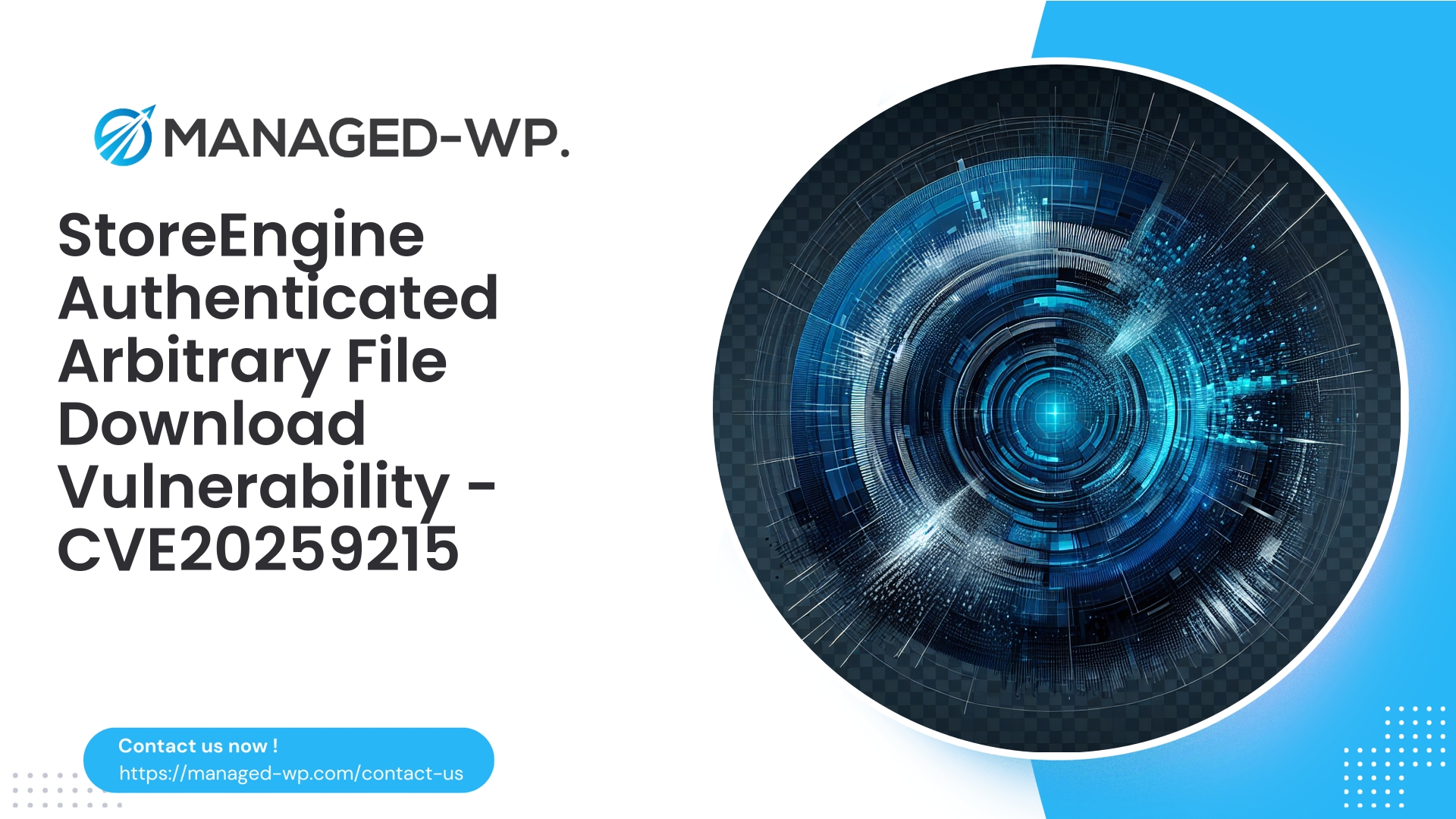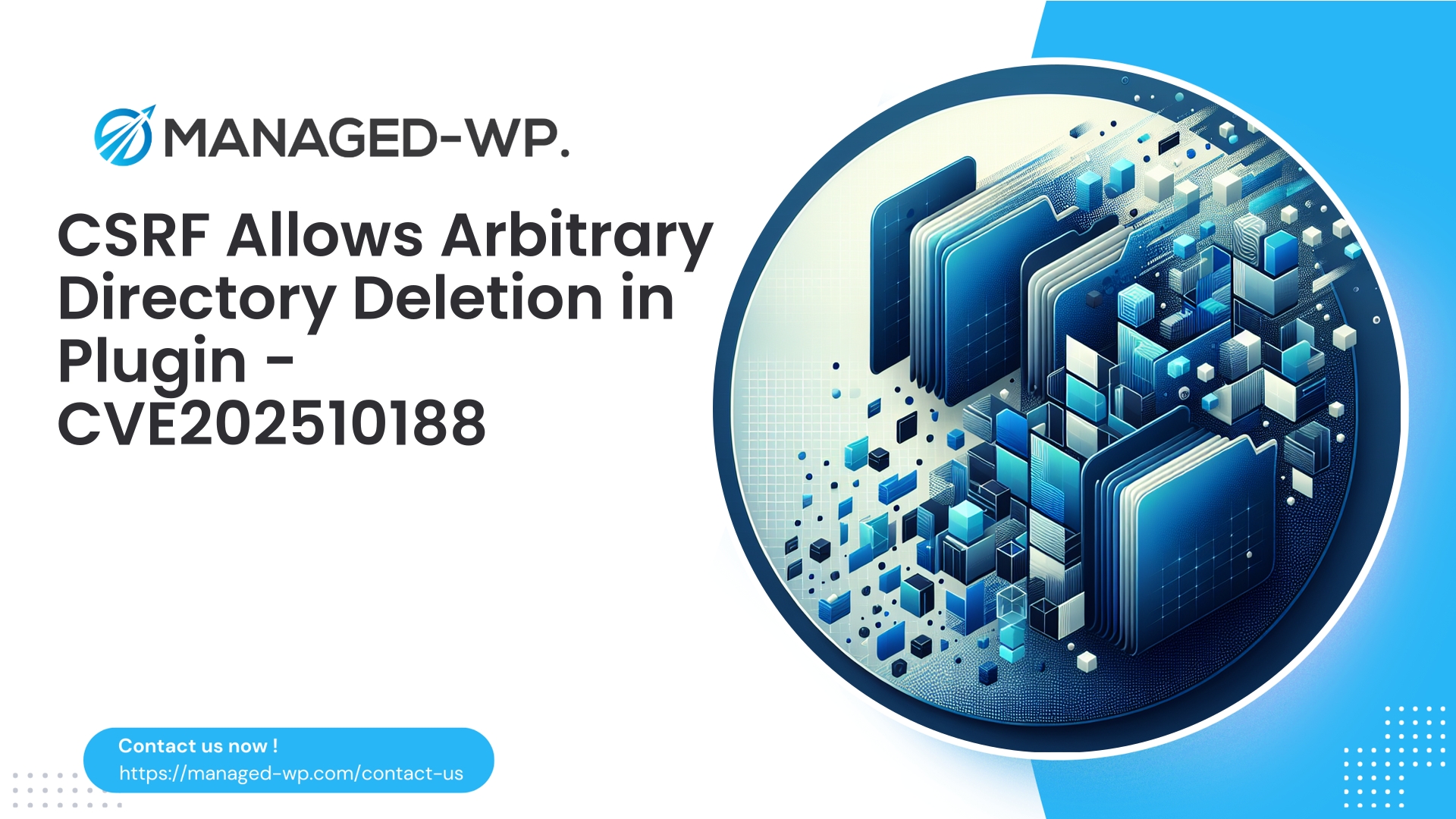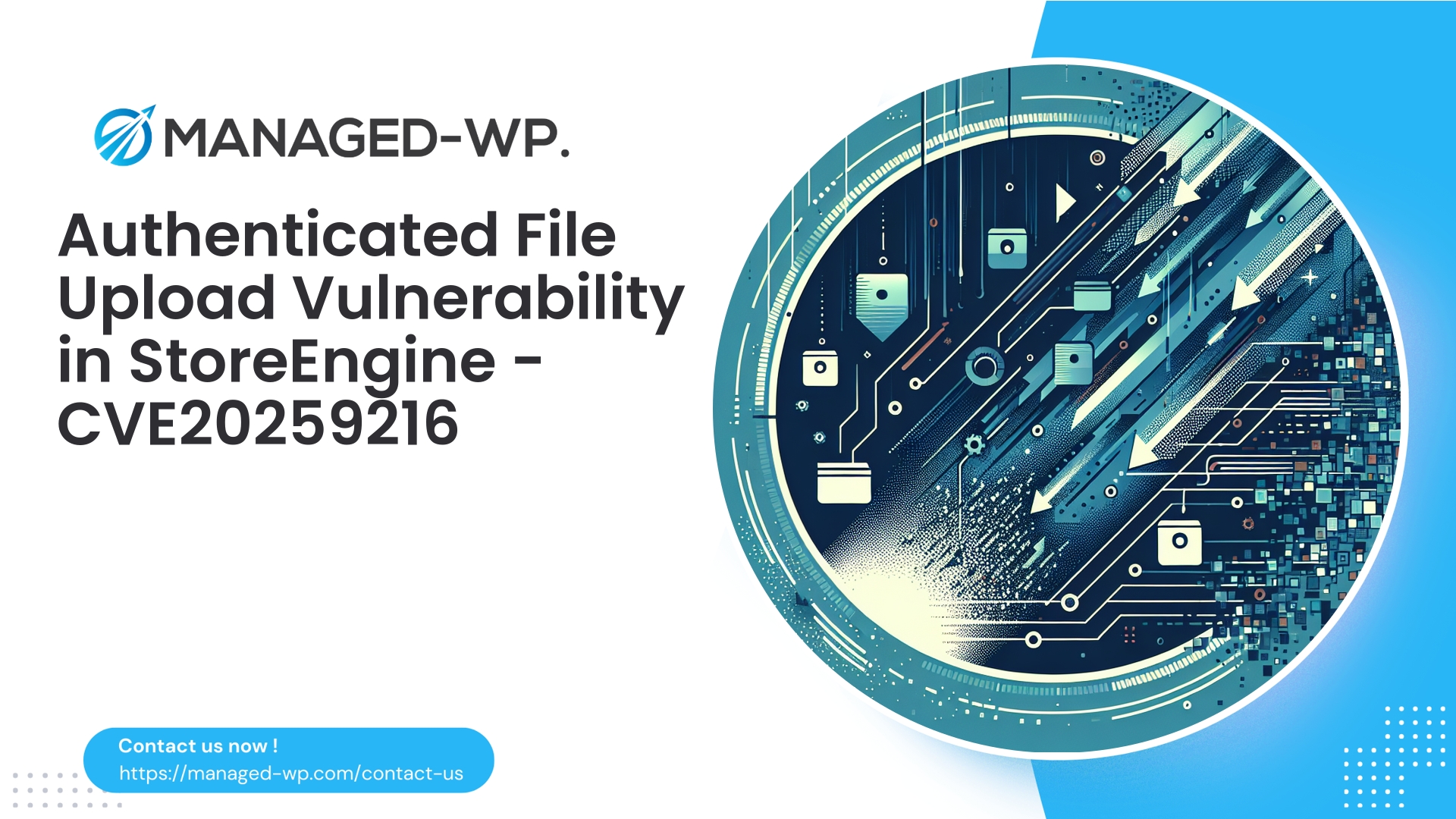| 插件名稱 | 商店引擎 |
|---|---|
| 漏洞類型 | 任何檔案下載 |
| CVE編號 | CVE-2025-9215 |
| 緊急 | 高的 |
| CVE 發布日期 | 2025-09-17 |
| 來源網址 | CVE-2025-9215 |
StoreEngine 外掛程式嚴重漏洞 (CVE-2025-9215):每位 WordPress 擁有者必須立即採取的措施
執行摘要
- StoreEngine 外掛程式 1.5.0 及更低版本存在嚴重安全漏洞 (CVE-2025-9215)。此漏洞允許任何擁有訂閱者等級存取權限的已認證使用者從您的伺服器下載任意檔案。
- 此漏洞風險極高(CVSS 評分 6.5),可能洩漏敏感文件,例如
wp-config.php資料庫備份、憑證、私鑰等等。 - 必須立即採取行動:請立即將 StoreEngine 外掛程式更新至 1.5.1 或更高版本。如果無法立即進行修補更新,請實施下列緩解措施,包括停用該外掛程式、套用 WAF 防護以及限制端點存取。
- 本文詳細介紹了威脅概述、利用方法、偵測指南、建議的 WAF 策略以及長期安全加固措施。
為什麼這種漏洞需要您關注
任意檔案下載漏洞允許惡意攻擊者獲取他們不應該訪問的檔案。即使是權限最低的使用者(例如訂閱者)也可以利用 StoreEngine 的這個漏洞下載伺服器上的任何檔案。攻擊者通常透過虛假註冊、網路釣魚或撞庫攻擊來獲取此類低階帳戶。
如果被利用,攻擊者可以存取您的 WordPress 設定檔(wp-config.php)、備份檔案、環境檔案和私鑰,將攻擊升級為資料庫竊取、未經授權的存取和網站完全接管。
自動掃描程式會迅速利用這些漏洞。如果您的網站運行的是 StoreEngine 1.5.0 或更早版本,請立即優先進行修復。
漏洞詳情
- 受影響的軟體: StoreEngine WordPress插件
- 受影響的版本: 1.5.0 及更早版本
- 補丁已發布: 版本 1.5.1
- 漏洞類型: 由於檔案存取控制存在缺陷,導致任意檔案下載(OWASP A3 / 注入攻擊系列)
- 所需權限等級: 已認證且具有訂閱者角色或更高權限的用戶
- CVE標識符: CVE-2025-9215
這個漏洞允許經過身份驗證的使用者建構請求,強制插件從伺服器檔案系統上的任何位置讀取和提供文件,從而繞過預期的存取限制。
攻擊場景概述
作為安全團隊,我們的重點是幫助防禦者了解和降低風險,因此,以下是一個簡化的攻擊描述:
- 攻擊者透過註冊、社交工程或竊取憑證等方式取得訂閱者帳戶。
- 他們找到了一個 StoreEngine 下載端點,該端點旨在提供與插件相關的檔案。
- 攻擊者發送帶有篡改參數的自訂請求,以指定任意檔案。
- 由於該插件對驗證和授權處理不當,它會傳回敏感文件的內容,例如
wp-config.php或備份存檔。 - 利用這些敏感數據,攻擊者可以提升權限,從而完全控制網站和後端。
筆記: 目錄遍歷有效載荷(例如, ../這些攻擊通常涉及不安全的直接物件參考 (IDOR)。
潛在影響和暴露數據範例
如果被利用,攻擊者可以:
- 使用權
wp-config.php並提取資料庫憑證和安全鹽,從而實現資料庫的完全攻陷。 - 下載包含未加密敏感資料的備份檔案。
- 公開設定檔中的 API 金鑰、OAuth 令牌和私有 SSL/TLS 金鑰。
- 識別存在漏洞的外掛程式和主題文件,以便發動更有針對性的攻擊。
- 取得詳細的伺服器日誌,揭示系統架構和弱點。
即使不立即接管網站,洩露私人和客戶資料也可能導致監管處罰並損害貴組織的聲譽。
如何檢測漏洞嘗試
將以下指標新增至您的安全監控和日誌分析:
- 針對 StoreEngine 插件目錄的異常 GET 或 POST 請求(例如,
/wp-content/plugins/storeengine/). - 查詢參數包含可疑的檔案路徑操作(
../,URL編碼的變體,例如%2e%2e%2f),或檔名以…結尾.php,.env,.sql,。拉鍊, ETC。 - 意外回應內容類型,例如
text/純文字或者text/x-php預期會有文件下載。 - 已認證的訂閱使用者帳戶下載大型文件或敏感文件,例如配置或備份存檔。
- 使用可疑 IP 位址建立新使用者帳戶後,立即嘗試下載檔案。
- 異常的 Content-Disposition 標頭反映了直接檔案串流行為。
- 插件端點通常提供小型資源,但會發出大量 200 OK 回應,這些回應會傳遞大型有效載荷。
- 文件下載後,出現可疑的管理員使用者同時建立或資料庫存取模式變更的情況。
日誌來源: Web 伺服器存取/錯誤日誌、PHP-FPM 日誌、WordPress 使用者註冊日誌、外掛程式特定日誌以及 WAF 日誌(如果已啟用)。
緊急補救措施
- 立即將 StoreEngine 插件更新至 1.5.1 或更高版本。
- 如果無法立即進行修補,請採取以下臨時緩解措施:
- 在修復補丁之前,請停用或卸載 StoreEngine 插件。
- 應用 Web 伺服器限制(例如,透過
.htaccess或使用 Nginx 規則)來拒絕外部存取 StoreEngine PHP 檔案。 - 部署 WAF 規則以阻止針對外掛端點的惡意請求。
- 加強檔案權限-確保
wp-config.php備份檔案不是全域可讀的(理想情況下權限為 600 或 640)。 - 如果不需要,則停用或限制使用者註冊;如果啟用,則強制執行機器人保護(CAPTCHA)、電子郵件驗證和速率限制。
- 補丁安裝後,使用非特權訂閱者帳戶在測試環境中進行測試,以驗證外掛程式功能。
建議的WAF策略以降低風險
雖然應用程式廠商修補程式至關重要,但 Web 應用程式防火牆 (WAF) 可以透過阻止針對此漏洞的常見攻擊模式來暫時縮小攻擊面。請根據您的 WAF 引擎(ModSecurity、Nginx、雲端 WAF 控制台或外掛防火牆)調整以下通用規則:
密鑰封鎖規則
- 拒絕未經身份驗證的對 StoreEngine 插件端點的請求。
- 阻止任何包含目錄遍歷序列的請求(
../或 URL 編碼的變體,例如%2e%2e%2f). - 阻止嘗試下載敏感文件類型的請求:
.php,.sql,.env,.git,.pem,。鑰匙,.bak,。拉鍊,。焦油,.gz, ETC。 - 標記或封鎖指示直接存取程式碼或設定檔的異常 Content-Disposition 或 Content-Type 標頭。
- 限制允許的 HTTP 方法並強制執行有效的 CSRF 令牌;如果端點預期只允許使用 nonce 驗證的 POST 請求,則阻止 GET 請求。
範例概念性 ModSecurity 風格規則片段
- 查詢字串中的區塊遍歷有效負載(例如,匹配)
(\.\./|\%2e\%2e\%2f)). - 透過外掛程式的端點阻止對受保護檔案副檔名的下載請求。
- 對每個使用者/IP位址進行速率限制,以防止暴力破解下載或枚舉。
重要的: WAF 規則是緊急應變措施,不能取代補丁。插件更新提供的是永久性解決方案。
日誌記錄和警報建議
配置監控系統,使其在以下情況下發出警報:
- 訂閱使用者角色存取外掛程式下載端點時使用可疑的檔案副檔名查詢。
- 通常用於提供小型資源檔案的端點出現大型下載回應(>1MB)。
- HTTP 請求傳回關鍵伺服器文件,例如
wp-config.php. - 新用戶註冊後,StoreEngine 端點回傳的 200 HTTP 回應數量激增。
仔細調整閾值以避免誤報;合法下載數位產品不應觸發警報,但異常的文件類型或大小應觸發警報。
事件回應指南
若發現或懷疑有網路攻擊企圖,請立即採取行動:
- 隔離
- 暫時封鎖涉事用戶帳戶,並透過防火牆或WAF封鎖來源IP位址。
- 在您的 WAF 上針對關聯的 IP 位址和漏洞利用模式建立暫時拒絕規則。
- 保存證據
- 收集並備份伺服器日誌、插件日誌和資料庫存取記錄。
- 對檔案系統和資料庫進行快照,最好以唯讀方式進行快照。
- 評估暴露情況
- 確定攻擊者訪問了哪些文件,重點關注
wp-config.php備份檔案和敏感腳本。
- 確定攻擊者訪問了哪些文件,重點關注
- 輪換憑證和金鑰
- 立即變更可能已洩漏的資料庫憑證、API 金鑰、鹽值和密碼。
- 撤銷/重新頒發任何已頒發的令牌或憑證。
- 消除持久性
- 搜尋 webshell、新的未經授權的管理員使用者、已更改的文件或任務計劃,以判斷是否存在後門。
- 使用可信任的離線工具或主機提供者的協助來驗證檔案系統的完整性。
- 恢復和驗證
- 僅從攻擊日期之前的乾淨備份中還原服務。
- 在恢復生產運作之前,請將插件更新至 1.5.1 版本。
- 進行全面的惡意軟體和完整性掃描。
- 通知利害關係人
- 如果個人資料遭到洩露,則需遵守法律法規要求。
- 詳細記錄時間表和補救措施,以便進行審計和事後分析。
長期加固建議
- 減少插件使用
- 刪除所有未使用或不必要的插件-軟體越少,漏洞就越少。
- 強制執行最小權限原則
- 限制管理員使用者數量;
- 確保訂閱用戶和客戶無法觸發特權操作。
- 安全用戶註冊
- 除非必要,否則禁用公開註冊;
- 如果開放,則強制執行嚴格的電子郵件驗證、驗證碼和速率限制。
- 加強檔案權限和伺服器設置
- 透過正確的檔案系統所有權和權限來限制對敏感檔案的存取。
- 使用 Web 伺服器規則阻止對備份檔案、日誌檔案和環境檔案的直接 Web 存取。
- 禁用 PHP 編輯
- 添加
定義('DISALLOW_FILE_EDIT',true);到wp-config.php防止使用外掛程式/主題編輯器。
- 添加
- 保持一切更新
- 透過經過測試的更新,維護 WordPress 核心、外掛和主題的最新版本。
- 使用測試環境在生產環境之前評估更新。
- 實施持續監控
- 啟用檔案完整性監控和集中式日誌記錄,並對可疑活動發出警報。
- 注意防範意外的大檔案下載和新管理員使用者的建立。
- 部署 WAF 和虛擬補丁
- 採用WAF技術來虛擬修補外掛程式漏洞並阻止惡意模式。
Managed-WP 如何為您提供協助
在 Managed-WP,我們深知保護 WordPress 網站免受 StoreEngine 任意檔案下載漏洞等威脅的迫切性。我們的託管安全服務可為 WordPress 環境提供即時且持續的保護。
全面安全管理 - ManagedWP
- 即時管理的防火牆和針對 WordPress 外掛程式風險客製化的強化型 WAF。
- 持續進行惡意軟體掃描和威脅緩解,以應對 OWASP Top 10 漏洞。
- 主動監控,包括偵測可疑下載和異常使用者活動。
- 快速回應並提供專家指導,以補救和恢復安全事件。
不要等到遭受攻擊才採取行動——使用 Managed-WP 值得信賴的安全解決方案來強化您的網站。了解更多並開始使用,請造訪: https://managed-wp.com/security-services.
立即行動清單
- 確定您的網站是否使用了 StoreEngine 插件,並確定其版本。
- 如果運行的是 1.5.0 或更低版本:
- 立即升級至 StoreEngine 1.5.1 版本。
- 如果無法立即更新,請停用/刪除該外掛程式並套用嚴格的防火牆和伺服器規則。
- 加強檔案權限
wp-config.php以及備份檔案。 - 檢查伺服器和應用程式日誌,尋找可疑的檔案存取和異常的新使用者帳戶。
- 如果懷疑系統遭到入侵,請按照事件回應步驟進行隔離、保存證據、輪換密鑰並還原乾淨的備份。
- 實施託管式 WAF 或類似 Managed-WP 的安全服務,以實現持續保護。
來自託管 WordPress 安全專家的最後總結
攻擊者會利用低權限漏洞,因為這些漏洞很容易成為自動化大規模攻擊的目標。最有效的防禦措施包括及時修補、主動防火牆、最小權限策略和嚴密監控。
如果您需要專家協助配置防護措施或驗證網站安全狀況,請聯絡 Managed-WP 的安全團隊。我們擁有多年保護 WordPress 網站免受複雜威脅的經驗,我們的服務可在您執行永久性修補程式的同時,提供至關重要的安全保障。
保持警惕,及早修補。
— Managed-WP 安全團隊



















